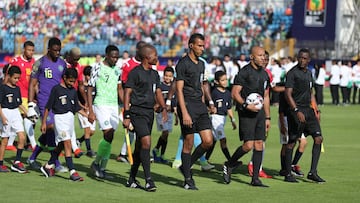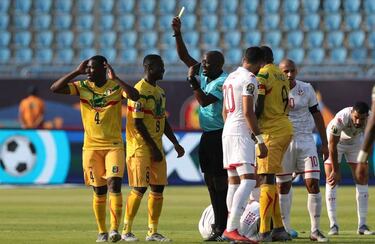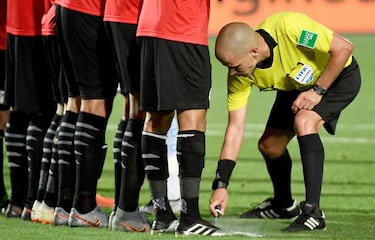Africa Cup of Nations 2019 serves up old-school refereeing
AFCON 2019 with VAR only due to be introduced in the quarter-finals, has offered a trip back to the old days of refereeing with some crunching tackles allowed and an absence of contentious handball penalties

The 2019 Africa Cup of Nations, with VAR only due to be introduced in the quarter-finals, has offered a trip back to the old days of refereeing with some crunching tackles allowed and an absence of contentious handball penalties.
The absence of the VAR system has led to a different style of officiating than seen in the Champions League, the Nations League and the Women's World Cup.
In contrast to those competitions, where the merest hint of contact or the most innocuous-looking handball can lead to a match-deciding penalty, AFCON referees have given defenders more leeway and generally greeted theatricals with disdain.

They have often avoided penalties that might have been awarded in other parts of the world, as Wilfried Zaha found out in Ivory Coast's 4-1 win over Namibia.
The Premier League-based player went down following a challenge by Larry Horaeb and made the most of it, but unimpressed referee Peter Waweru of Kenya waved play on.
Similarly, Senegal forward Sadio Mane was denied a penalty when he was sandwiched between Algeria defenders -- a decision which would almost certainly have gone in his favour if he had been playing for Liverpool in the Premier League or Champions League.
Of the eight penalties awarded in the 36 group matches, all were for obvious fouls and none were for handball.
There has been a general absence of theatrical behaviour by the players who have generally avoided going to ground at the slightest contact.
Apart from a few exceptions, the tournament has also been happily free of the so-called "mobbing" of referees, where players bully the official by surrounding him, shouting and gesticulating.
#TotalAFCON2019
— CAF (@CAF_Online) July 4, 2019
Let's the knockout phase of the tournament begin! It's time to make your final predictions and select the winner of the competition @1xbet_Eng! 🎁
An unhappy side-effect, however, is that, with referees producing yellow cards for only the roughest of tackles, the foul count has been very high.
Teams have been able to use so-called tactical fouling in midfield to disrupt their opponents' rhythm and prevent them stringing passes together.
Algeria, who won their group without conceding a goal, clocked up a remarkable 28 fouls in their 1-0 win over Senegal, yet received only two yellow cards. Senegal also received two yellows for 18 fouls in a stop-start match.
Cameroon's 0-0 draw with Ghana produced 28 fouls but only one yellow card, Ghana's 2-0 win over Guinea Bissau featured 44 free kicks as did Morocco's 1-0 win over Ivory Coast -- 27 of them from Morocco -- but only two bookings.
Eccentric decisions
There have been eccentric decisions such as the sending-off of Ghana defender John Boye against Benin -- one of only three red cards in the group stage.
Already booked, Boye stepped up to take a free kick inside his own half, moved away to let goalkeeper Richard Ofori take it and was given a second yellow card by Youssef Essrayri of Tunisia.
Still, there has barely been a post-match interview or news conference where refereeing has been the main issue and it will be intriguing to see what happens when VAR comes into play especially given the Confederation of African Football's (CAF) unhappy recent experience with the new technology.

In the second leg of the CAF Champions League final last month, Moroccan side Wydad Casablanca refused to play on against Tunisia's Esperance after having a goal disallowed and walked off the pitch when the decision was not referred to the Video Assistant Referee (VAR).
Related stories
Esperance were immediately declared champions but CAF later backtracked and awarded a replay which has yet to take place.
In the meantime, participants seem happy with what they have got. "When we come to different parts of the world, it's exactly what we like," said Cameroon coach Clarence Seedorf after the Ghana match. "To be diverse, and not expect the same thing in every country."
